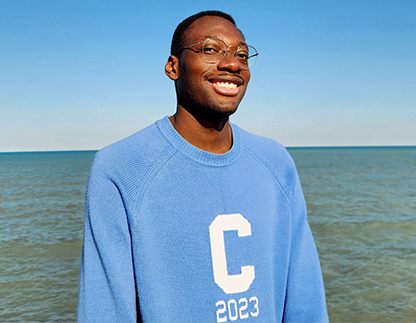I am motivated to use the privileges I often take for granted to bridge gaps in accessibility through human-centered research.”
Abdul Latif Bamba
PhD Candidate in Electrical Engineering

Abdul Latif Bamba is a PhD candidate in the Electrical Engineering Department in the McCormick School of Engineering. His research centers on nanophotonics—particularly the ways in which light interacts with nanoparticles. Abdul is a recipient of the Ryan Fellowship and the National Science Foundation Graduate Research Fellowship.
How would you describe your research and/or work to a non-academic audience?
My current research is in nanophotonics, which involves trapping and concentrating light into extremely small areas at the nanoscale, much smaller than what conventional optical technologies can achieve. The focus of my research is to understand the interactions of light with molecule-sized materials.
Through these minute interactions, my work in Professor Hooman Mohseni’s group has the potential to accomplish what may have previously been seen as impossible, ranging from sensing and imaging singular tumor cells to using small metallic particles to heat the surface of Mars for human habitation; the only limit is our own creativity.
Tell us what inspired your research and/or work.
My research is driven by a deep desire to address inequities and inadequacies in technology, a passion rooted in personal experiences, and a commitment to meaningful change, which evolved into a focus on nanophotonics for sensing and advanced technological tools.
As a child of immigrants, I became acutely aware of disparities that shaped the lives of those around me, leading me to engineering as a way to solve real-world problems. I am motivated to use the privileges I often take for granted to bridge gaps in accessibility through human-centered research. Though I am still in the early stages of my journey, I want to stay true to my purpose and keep the scope of my research on real people, because research and academia offer a unique opportunity to engage directly with those who can benefit from my work.
What is a mistake you have learned from in your career?
A mistake I often make, and try to learn from, is working in a vacuum at times. I feel I am an incredibly introspective person, so my natural approach to challenges in research or difficult periods in my life is to initially tackle them on my own. Unsurprisingly, without bouncing ideas off other people or leaning on others for support, I find this mentality leads me to lose the plot of my story and forget the "why." The stress of a challenging time in research or in life, for that matter, is often ephemeral, but I find that the connections made with people, with science, and with oneself along the way are indelible.
What do you find both rewarding and challenging about your research and/or work?
To me, the challenge itself is part of the reward. Research requires trusting in your own ability to tackle problems that may never have been solved before. Building that confidence in myself, while also sharing and connecting with others, is the most fulfilling aspect of my work.
How do you unwind after a long day?
Music has always been a centering force for me, so after a long day, I usually unwind with my headphones in and my volume up while cleaning whatever space I am occupying. Unfortunately, that means that if my room is very clean, I probably had a pretty long day…
What books are on your bedside table?
Currently, the two books on my bedside are the novel Martyr! by Kaveh Akbar and How High We Go in the Dark by Sequoia Nagamatsu. I am enamored with stories that feel almost overwhelmingly human and capture the full range of emotions. I find that I learn more about myself with a story like this than any nonfiction book could ever teach me.
What inspires you?
Sunsets inspire me. They occur every day, but often, life moves too quickly to see and appreciate them. This prompts reflection and introspection for me. They also remind me to keep my eyes on the sky and not glued to my shoes.
What advice would you give your younger self or someone considering a similar path?
To my younger self or anyone considering a similar path, wherever you happen to be, you are exactly where you need to be to succeed. Everything you need is within, and you are doing enough.
Tell us about a current achievement or something you're working on that excites you.
Outside of my research, I was excited to connect with the greater community through the Graduate Engagement Opportunities (GEO) Community Practicum this Spring Quarter. I worked at the Museum of Science and Industry on studies that are extremely important to me as a minority in academia—the topic of what it means to “belong.” On top of that, with the Museum I worked on programs that intend to extend STEAM education into primary and secondary schools in West Chicago.
Publish Date: June 24, 2025
If you know a graduate student, postdoctoral scholar, graduate faculty member, staff member, or a member of our TGS alumni population who would make a great candidate for our TGS Spotlight Series, please complete this brief TGS Spotlight Series Nomination Form.